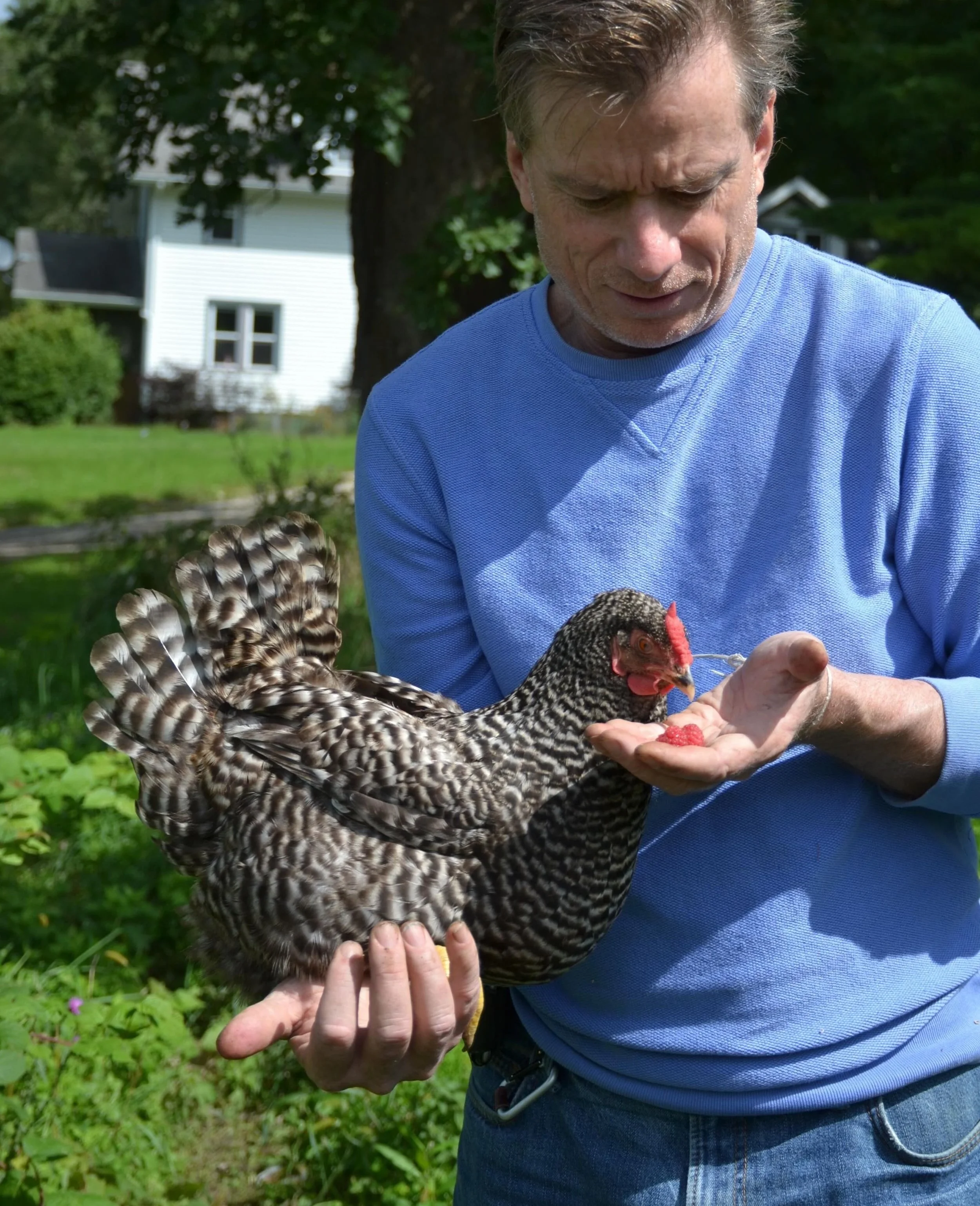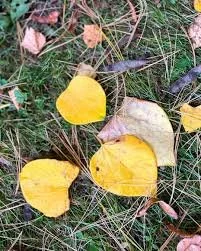130 - Guest post: The death of a survivor
Chickens are a big part of life here at the farmstead. My major sources of protein this time of year are, in order, eggs, wild trout and venison. I love my hens (the rooster, Harry, not so much...). I also love the writing of Matt Geiger, my editor at the Mount Horeb Mail newspaper, where I have a monthly column. And herewith below, dear readers, something that combines both - a sublime column by Matt about a special chicken (and as usual for Matt, also about life). Enjoy!
[Pictured above is my own favorite hen of all time, Betty, killed in the coop by an opossum when she was about four.]
On another note, the turn has started. While trout fishing of late I've been seeing an undeniable sign of fall - Cedar Waxwings beginning to gather in clusters. Also, walking back to my car from a stream recently, some yellow aspen leaves fell onto the path at my feet; golden coins, like an advance payment on the riches to come. And last night I made my first batch of apple sauce of the year, courtesy of the stalwart generosity of the trees behind the house. Cedar Waxwing flocks, fresh apple sauce, and the Packers playing in the preseason. Autumn is stepping up - and again, enjoy!
The death of a survivor
Matt Geiger, 2025
“Look into the eyes of a chicken and you will see real stupidity. It is a kind of bottomless stupidity, a fiendish stupidity. They are the most horrifying, cannibalistic and nightmarish creatures in the world.” -Werner Herzog
This morning the sky turned black. An ominous groan of thunder made the walls of our house tremble. Then the spring rains came, drenching the Earth as they do every year. Moments earlier, I had removed a dead hen from our chicken coop, her white and orange feathers soft but her body stiff and hard and strangely flat.
I love animals, but my favorite thing about them is that they are not humans, so I generally don’t anthropomorphize them. I don’t pretend our chickens think or feel or act like we do. Doing so would rob them of their chicken-ness. It’s the same reason I don’t force my dogs to wear sweaters or imagine that my cat is just a furious little gray man.
I like animals, as Mr. Rogers always said of people, just the way they are.
Because of this, and because I grew up on a farm, I am usually pretty unsentimental about the lives and deaths of our chickens. We feed them, keep them as safe as we realistically can from the weather and various predators that prowl our neighborhood, but I don’t name them, and I don’t weep, or rip my clothing or gnash my teeth when they inevitably die from any in a galaxy of causes. I give them discarded grain from a local brewery and scraps from our kitchen and the grocery store, and when they die, I go and get another one.
But the chicken that died last night did have a name. It wasn’t a moniker given at birth. It was one she earned over the years. We didn’t sit around and come up with her name. We all just started calling her by it because of how she lived her life.
She was known in our family as “The Survivor.”
She was what is commonly called an Easter Egger, or Ameraucana, an American riff on a Chilean breed that lays bluish eggs. We got her at Farm and Fleet seven years ago for a couple bucks, when our daughter was only a toddler. It was so long ago I don’t even recall which other chicks she came home with. I do know that in the ensuing years, countless birds came and went, and this one chicken was there for all of it. She was stalwart and rugged. She escaped countless brushes with death, evading hungry racoons, possums, foxes, weasels, hawks and owls. She sometimes roosted high in the trees in the middle of icy, subzero winter storms and refused to come down, tucking her face and her feet into her downy feathers and waiting for the skies to clear. She never let humans near her, but she was never far away at feeding time.
After nocturnal predatory raids, we would often go outside and find her, safe and sound, profoundly unaffected by the carnage around her. She was a good layer, producing eggs throughout most of the year for all her life. While most of the eggs on our counter were white or brown, we always knew which ones were hers, because she was the only bird in our flock whose embryos came in a delicate blue casing.
We often joked that she would never die. And this past winter, when temperatures dropped below zero and winds howled out of the north, she seemed perfectly fine when I went out each morning to make sure they had water.
And then, just as spring arrived, just a few days after we had made our annual improvements to the coop, I saw her sitting on the ground, slowly nodding off. She didn’t seem sick. She wasn’t skinny or ill. She hadn’t been attacked by some marauding creature. She was just expiring. She was about seven years old, after all, which I believe is the equivalent of a human living to 208.
I gave her a little nod and walked away. My wife and daughter went out and covered her with a blanket that evening, a gesture I suspect was lost on her primordial dinosaur mind but which nonetheless warmed their thudding mammalian hearts.
That was last night. This morning she was dead.
And I can’t help but wonder, What is the point? Why live for so long, surviving so much, only to fall asleep one spring evening and never wake up? It doesn’t make any sense to me. It harkens back to one of the greatest Onion headlines: “Existentialist Firefighter Delays 3 Deaths.” It makes every day feel like a temporary reprieve rather than a permanent gift.
In the novel “Suttree,” the protagonist speaks with a “ragman” about death.
“And what happens then?
When?
After you’re dead.
Dont nothin happen. You’re dead.
You told me once you believed in God.
The old man waved his hand. Maybe, he said. I got no reason to think he believes in me. Oh I’d like to see him for a minute if I could.
What would you say to him?
Well, I think I’d just tell him. I’d say: Wait a minute. Wait just one minute before you start in on me. Before you say anything, there’s just one thing I’d like to know. And he’ll say: What’s that? And then I’m goin to ast him: What did you have me in that crapgame down there for anyway? I couldnt put any part of it together.”
Perhaps it’s just my mammalian brain getting in the way, and maybe that dead chicken’s velociraptor heart knows the answer better than I ever could. But I can’t personally make heads nor tails of it.
The dead chicken makes me think of Doc Holliday, the famous consumptive gunslinger who was shocked to die quietly in bed, rather than in a saloon or on a street with his boots on. He was reported to have looked down at his naked feet and muttered, “This is funny...” just before drawing his last breath.
So, here is to The Survivor. A creature with an unfathomable mind that lived and died in some crapgame I can’t make any particular sense of. Perhaps the most important thing about her is that she earned herself a name, and she forged herself a story, and endured many harsh winters, before vanishing just as the spring rains began falling to the ground, just as they do every year.
Comment, share, support - with thanks.

